Getting to the truth about what Covid-19 is really doing to our health and economy is like searching for a very small needle in a dozen very large haystacks.
Accurate information would help us to understand what is going on with this global pandemic, but which data can you trust and who is telling you the truth?
Should the Government’s Chief Scientific Adviser, Sir Patrick Vallance’s, prediction of 50,000 infections a day by mid-October with multiple increases in the UK death rate scare you witless? Or do you side with Bank of England Chief Economist Andy Haldane who takes the Rooseveltian position that “we have nothing to fear but fear itself”?
Years of working in financial analysis teaches you to set aside the myriad of views that create what Warren Buffet terms “noise” and dig for the cold, hard facts. In the UK, we are blessed with the Office for National Statistics (ONS), an independent organisation that is staffed by first-class statisticians. The ONS has built a strong reputation for presenting detailed ‘spin-free’ information.
Looking at the Stats
Chart A below shows the weekly number of deaths in England and Wales during 2020, divided between those relating to Covid-19 (in red) and those relating to other causes (in grey). You can clearly see the spike in deaths between week 13 and week 19 (end of March to mid-May). The average of all deaths over the last five years is shown as a black line.
Chart A
Number of Deaths Registered in England & Wales by week
28/12/2019 to 25/09/2020
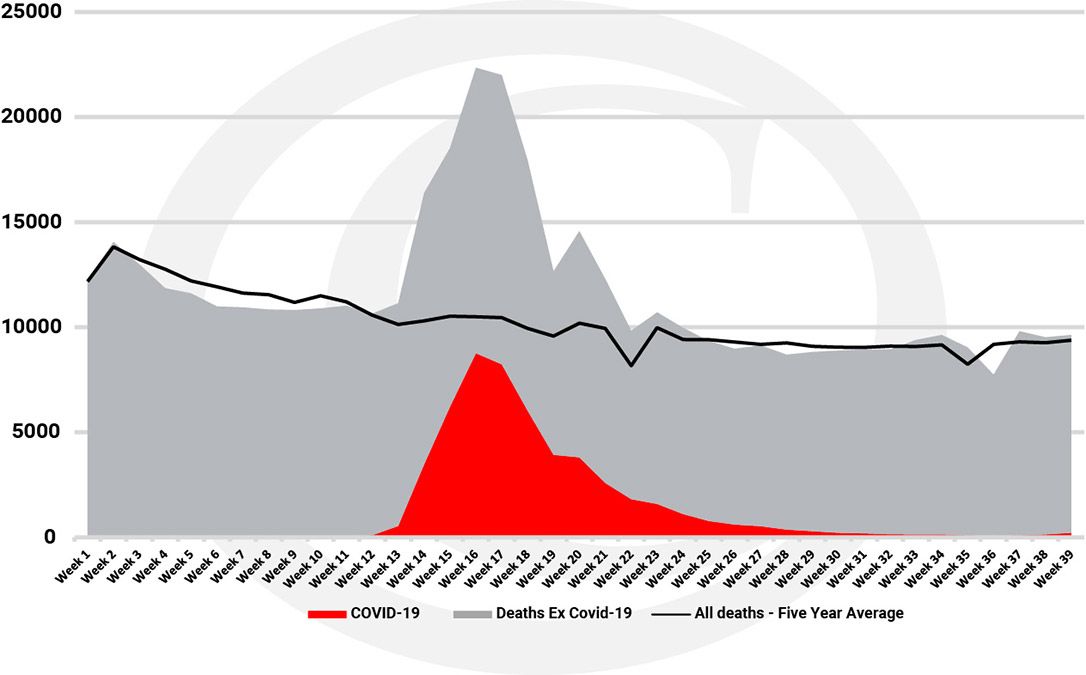
Source: Office for National Statistics (ONS)
Chart B shows the cumulative number of deaths in England and Wales during 2020 (the brown line) compared with trend-cumulative deaths based on the last 5 year average rates of death. You can see that total deaths so far this year register at 453,803, whereas average deaths would have registered a figure of 399,883. This means that Covid-19 has, so far, contributed to excess deaths in England and Wales estimated at nearly 54,000.
Chart B
Cumulative Number Of Deaths Registered in England & Wales by week
28/12/2019 to 25/09/2020
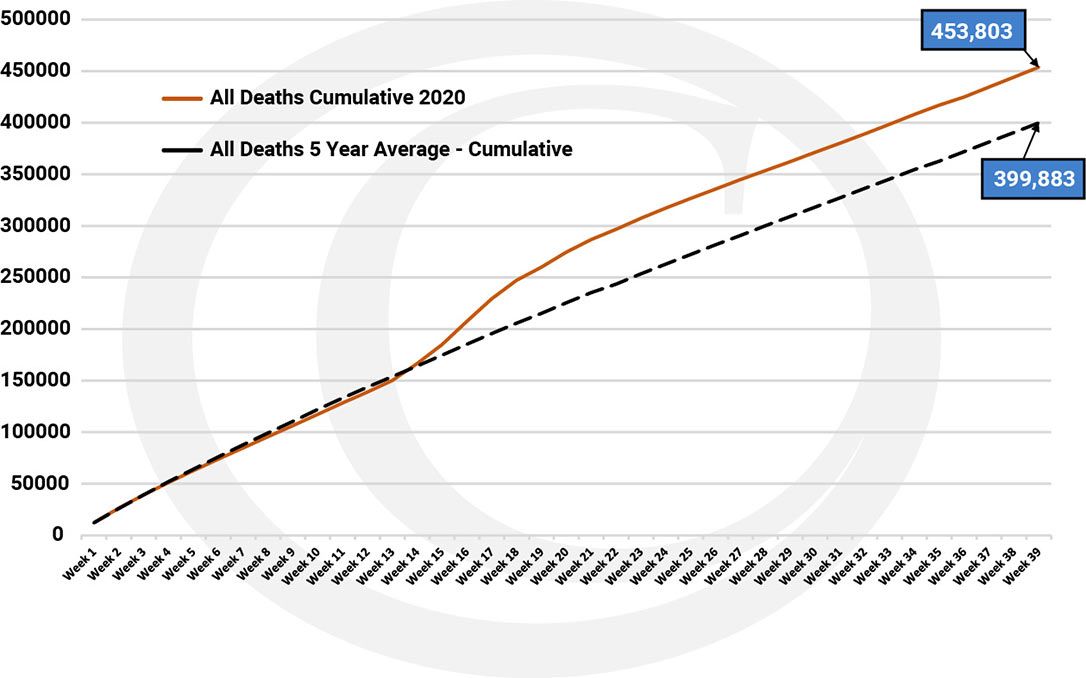
Source: Office for National Statistics (ONS)
Most Covid-19 deaths occur in hospital, as highlighted by Chart C below.
Chart C
Place Of Death from Covid-19 England & Wales Only
Year to 25/09/2020
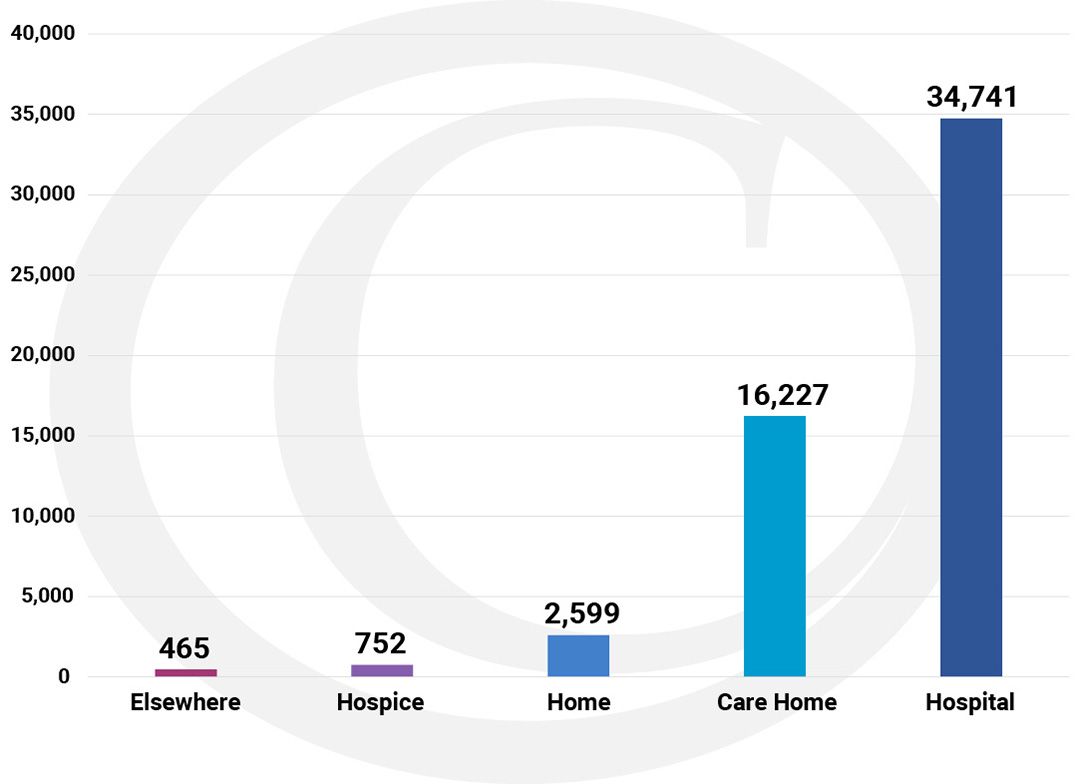
Source: Office for National Statistics (ONS)
The second biggest location of deaths is in care homes which, as Chart D below indicates, accounts for nearly 30% of total deaths in 2020. The NHS policy of returning sick patients to their place of residence was disastrous for the elderly infirmed that occupy care homes.
Chart D
Place Of Death from Covid-19 England & Wales Only
Year to 25/09/2020
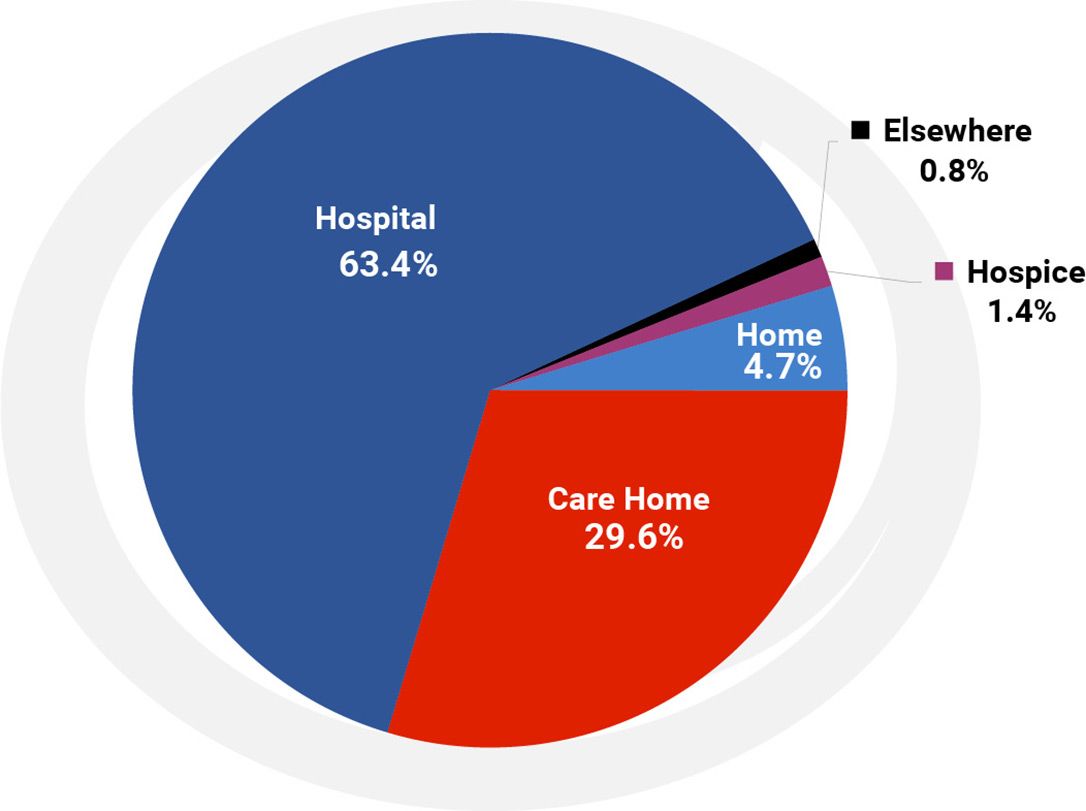
Source: Office for National Statistics (ONS)
Back in the spring, epidemiologists were comparing Covid-19 to the Spanish Flu pandemic which blighted the globe in 1918 at the end of WWI. The data* clearly shows that Spanish Flu, which was no respecter of age, killing young and old alike, was very different to Covid-19 which preys, almost exclusively, on the elderly.
Chart E shows data on deaths by age groups.
Chart E
Covid-19 Related Deaths in England & Wales
28/12/2019 – 25/9/2020
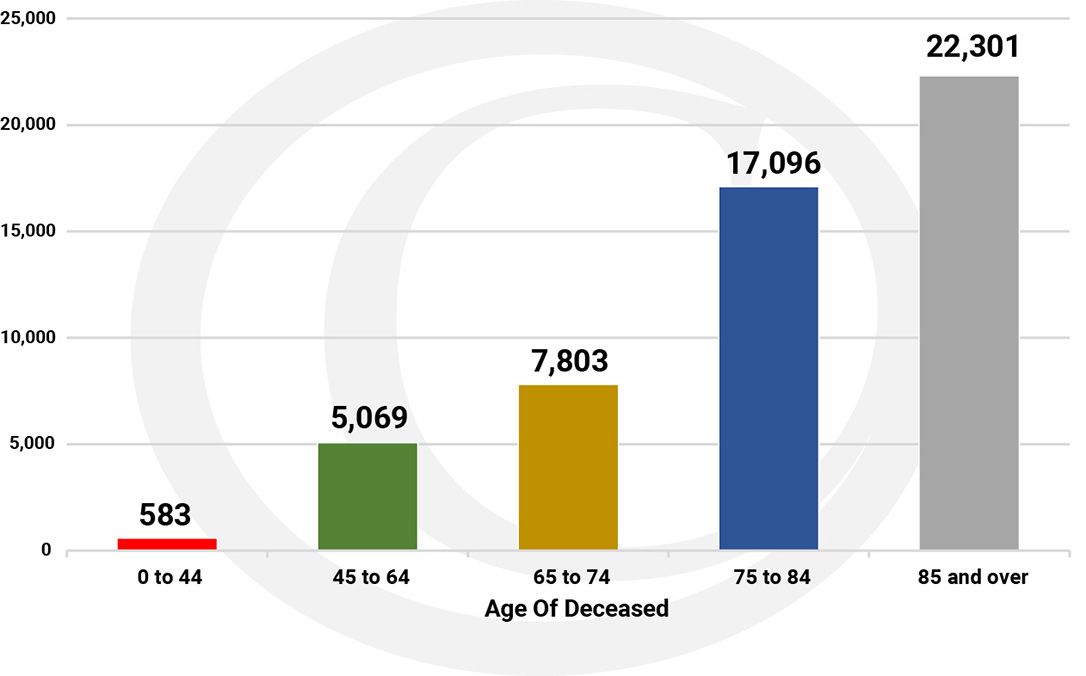
Source: Office for National Statistics (ONS)
It is the elderly in this country that have suffered at the hands of the Coronavirus. Only 1.1% of deaths in England and Wales have been amongst those aged under 45.
Chart F
Covid-19 Related Deaths in England & Wales
28/12/2019 – 25/9/2020
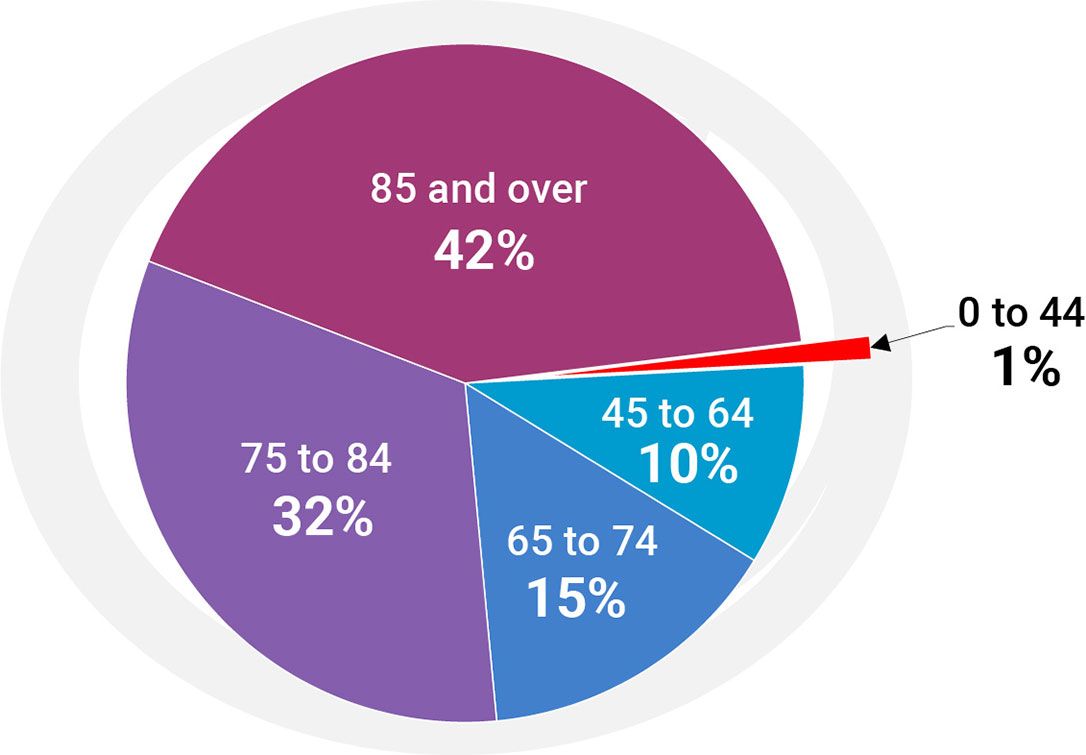
Source: Office for National Statistics (ONS)
Moving on
Covid-19 is a nasty illness which can spread through a population like wildfire in a dry forest. We have, however, in the space of just a few months, become better at treating it, and better at controlling it. Dexamethasone (a steroid) has proved highly effective at reducing the symptoms associated with Covid-19, and handwashing and distancing are effective at reducing the spread of the pathogen. Of course there is a nasty side, Covid-19 kills people, but so does cardiovascular disease (457 deaths per day in the UK), cancer (450 deaths per day) and dementia (214 deaths per day). These are all killers that we have learnt to live with and we will, in time, learn to live with Covid-19, whilst ameliorating the effect it has on those who contract it and reducing the numbers that it kills.
Let me finish with a glowing, brilliant, shiny silver lining in this dark Covid cloud, unusually from an economist, a field that has earned a reputation, deservedly, for being the most pessimistic of professions.
On 30th September 2020 the Bank of England’s Chief Economist, Andy Haldane, delivered a speech to the Cheshire and Warrington Local Enterprise Partnership. He covered the economy which, to his and his fellow Bank of England colleague’s astonishment, has been performing exceptionally well. During his speech, Haldane said:
“The speed and scale of the UK’s recovery has surprised to the upside, persistently and significantly, for at least the past 4 months……had this economic outcome been offered as a forward contract in the early summer months, absolutely everyone would have been a buyer”.
Haldane concluded:
“My concern at present is that good news on the economy is crowded-out by fears about the future. This is human nature at times of stress. But it can also make for an overly-pessimistic popular narrative, which fosters fear, fatalism and excess caution. This is unhealthy in itself but, if left unaddressed, also risks becoming self-fulfilling. I have a Rooseveltian fear of fear itself. If the economy was sat on a psychiatrist’s sofa, the diagnosis would not be especially difficult. A propensity to dismiss good news and to dwell on bad? To catastrophise about the future? The sense of events being beyond our control? These are the psychological symptoms of anxiety. And collective anxiety is as contagious, and could be as damaging to our well-being as this terrible disease”.
Our leaders should heed Haldane’s warning that excessive pessimism will be to the detriment of our mental, physical and economic health. It would be better if ministers and their departmental heads concentrated more on trusting the British people with the facts rather than trying to terrify them into pursuing policies that change by the day.
Perhaps it is no coincidence that the economy has thrived with the Bank of England working closely with the Treasury, which is led by Rishi Sunak, the undoubted bright light in a Cabinet that was recently described by Oliver Shah in The Sunday Times as “….a government of thin talents”.
Covid-19 will pass. Pandemics tend to last for around 18 months and then tail away. We will have learned a lot through this experience and we will apply it to making the future brighter…for ourselves, and our children. In this view, I have history on my side. Humankind is an extraordinarily resilient animal.













